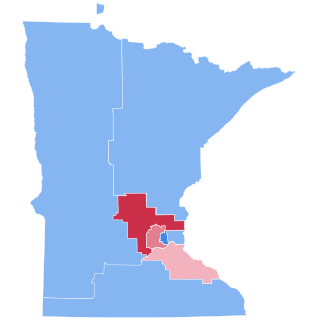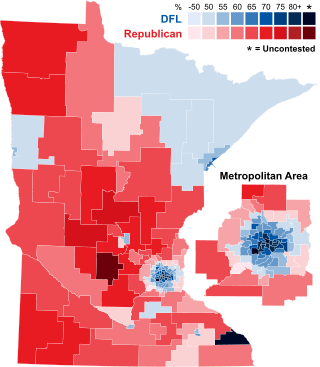Related Research Articles

Joseph Alfred Arner Burnquist was an American attorney and Republican politician in Minnesota. He served in the Minnesota State Legislature from 1909 to 1911, was elected the 20th Lieutenant Governor of Minnesota in 1912, and then served as the 19th Governor of Minnesota from December 30, 1915, to January 5, 1921. He became governor after the death of Governor Winfield Scott Hammond (1863–1915).

The Star Tribune is the largest newspaper in Minnesota. It originated as the Minneapolis Tribune in 1867 and the competing Minneapolis Daily Star in 1920. During the 1930s and 1940s, Minneapolis's competing newspapers were consolidated, with the Tribune published in the morning and the Star in the evening. They merged in 1982, creating the Star and Tribune, and it was renamed to Star Tribune in 1987. After a tumultuous period in which the newspaper was sold and re-sold and filed for bankruptcy protection in 2009, it was purchased by local businessman Glen Taylor in 2014.

The Republican Party of Minnesota is the state affiliate of the Republican Party in Minnesota and the oldest active political party in the state, being founded in 1855. The party controls four of Minnesota's eight congressional House seats. The last Republican governor of the state was Tim Pawlenty, who served from 2003 to 2011. The party's headquarter is located in Edina, Minnesota and the current chairman is David Hann.

The St. Paul Pioneer Press is a newspaper based in Saint Paul, Minnesota, United States. It serves the Minneapolis–Saint Paul metropolitan area. Circulation is heaviest in the east metro, including Ramsey, Dakota, and Washington counties, along with western Wisconsin, eastern Minnesota and Anoka County, Minnesota. The paper's main rival is the Star Tribune, based in neighboring Minneapolis. The Pioneer Press has been owned by MediaNews Group since April 2006. It no longer includes "St. Paul" as part of its name in either its print or online edition, but its owner still lists the paper's name as the St. Paul Pioneer Press and the paper also calls itself the St. Paul Pioneer Press on its Facebook and Twitter pages. Its URL and digital presence is TwinCities.com.

Michael Alan Hatch is an American politician and lawyer. He was the Attorney General of Minnesota from 1999 to 2007, commissioner of the Minnesota Department of Commerce from 1983 to 1989, and chair of the Minnesota DFL Party from 1980 to 1983.

The 2008 United States Senate election in Minnesota took place on November 4, 2008. After a legal battle lasting over eight months, the Democratic–Farmer–Labor Party (DFL) candidate, Al Franken, defeated Republican incumbent Norm Coleman in one of the closest elections in the history of the Senate, with Coleman's Senate predecessor Dean Barkley taking third place. Franken took his oath of office on July 7, 2009, more than half a year after the end of Coleman's term on January 3, 2009.
The following table indicates the party of elected officials in the U.S. state of Minnesota:

Michelle Louise Helene Fischbach is an American attorney and politician who is the U.S. representative from Minnesota's 7th congressional district. The district, which is very rural, is Minnesota's largest congressional district and includes most of the western area of the state. A Republican, Fischbach served as the 49th lieutenant governor of Minnesota under Governor Mark Dayton.

The 2014 Minnesota gubernatorial election took place on November 4, 2014, to elect the governor of Minnesota concurrently with the election to Minnesota's Class II U.S. Senate seat, as well as other elections to the United States Senate in other states and elections to the United States House of Representatives and various state and local elections.

The St. Paul Globe, at times the Saint Paul Globe, the Daily Globe, St. Paul Daily Globe, was a newspaper in Saint Paul, Minnesota, which was published from January 15, 1878, to April 20, 1905. The newspaper's existence coincided with a fivefold increase in the city's population.

The 2014 Minnesota House of Representatives election was held in the U.S. state of Minnesota on November 4, 2014, to elect members to the House of Representatives of the 89th Minnesota Legislature. A primary election was held in several districts on August 12, 2014.

The 2016 United States House of Representatives elections in Minnesota were held on November 8, 2016, to elect the eight U.S. representatives from the state of Minnesota, one from each of the state's eight congressional districts. The elections coincided with the 2016 U.S. presidential election, as well as other elections to the House of Representatives, elections to the United States Senate and various state and local elections. The primaries were held on August 9. This is the last cycle Democrats won either the 1st or 8th district.

The 2016 Minnesota House of Representatives election was held in the U.S. state of Minnesota on November 8, 2016, to elect members to the House of Representatives of the 90th Minnesota Legislature. A primary election was held in several districts on August 9, 2016. The election coincided with the election of the other house of the Legislature, the Senate.

The 2016 Minnesota Senate election was held in the U.S. state of Minnesota on November 8, 2016, to elect members to the Senate of the 90th and 91st Minnesota Legislatures. A primary election was held in several districts on August 9, 2016. The election coincided with the election of the other house of the Legislature, the House of Representatives.
Robert L. "Bob" Pavlak, Sr. was an American police officer and politician.

The seventy-first Minnesota Legislature first convened on January 3, 1979. The 67 members of the Minnesota Senate were elected during the General Election of November 2, 1976, and the 134 members of the Minnesota House of Representatives were elected during the General Election of November 7, 1978.

The 2022 Minnesota gubernatorial election took place on November 8, 2022, to elect the governor of Minnesota. Incumbent Democratic (DFL) Governor Tim Walz defeated the Republican nominee, former state senator Scott Jensen, winning a second term.

The 1890 Minnesota Senate election was held in the U.S. state of Minnesota on November 4, 1890, to elect members to the Senate of the 27th and 28th Minnesota Legislatures.

Elections were held in Illinois on Tuesday, November 7, 1978.

The 2020 Minnesota House of Representatives election was held in the U.S. state of Minnesota on November 3, 2020, to elect members to the House of Representatives of the 92nd Minnesota Legislature. A primary election was held in several districts on August 11, 2020. The election coincided with the election of the other house of the Legislature, the Senate, and other elections.
References
- 1 2 3 4 5 6 7 8 "Harlan Page Hall (1838-1907) - Find A Grave..." www.findagrave.com.
- ↑ Castle, History of St. Paul and Vicinity, p. 1196
- 1 2 3 4 5 6 Weber, "The Story of the St. Paul Globe," p. 327.
- ↑ Castle, History of St. Paul and Vicinity, pp. 1192, 1199-1200
- ↑ Castle, History of St. Paul and Vicinity, pp. 1199-1200
- 1 2 Castle, History of St. Paul and Vicinity, p. 1200
- 1 2 3 4 5 "St. Paul Pioneer Press". Ballotpedia.
- 1 2 3 4 5 Burnquist, Minnesota and Its People, Vol. 3, p. 108
- ↑ Castle, Henry A. (1912). History of St. Paul and vicinity : a chronicle of progress and a narrative account of the industries, institutions, and people of the city and its tributary territory. Vol. I. Chicago: Lewis Pub. Co. p. 116.
- ↑ "ST. PAUL DISPATCH-PIONEER PRESS". Minnesota Historical Society. Retrieved 20 September 2011.
- 1 2 3 Burnquist, Minnesota and Its People, Vol. 3, p. 113
- ↑ "World's Most Expensive Timepieces". Bloomberg L.P. Archived from the original on December 8, 2009. Retrieved 20 September 2011.
- 1 2 3 "ST. PAUL DISPATCH-PIONEER PRESS: An Inventory of Its Records at the Minnesota Historical Society". Minnesota Historical Society. Retrieved 2020-06-27.
- ↑ "Charles K. Blandin › Blandin Foundation". Blandin Foundation. October 10, 2013.
- ↑ "Media mogul was owner of hockey team". Tribune Democrat. Johnstown, Pennsylvania. June 26, 2000. p. 21.

- 1 2 3 4 5 6 7 8 9 10 11 12 13 14 "Scheibel v. Pavlak". Justia Law.
- ↑ "MN Constitution". www.revisor.mn.gov.
- 1 2 3 4 5 6 Wattson, Peter S. (August 29, 2008). "Judging Elections, Returns and Qualifications of a Legislator" (PDF). Retrieved 2020-06-27.
- ↑ 71st Minnesota Legislature
- ↑ "Rodriguez, Sr., Frank J. - Legislator Record - Minnesota Legislators Past & Present". www.leg.state.mn.us.